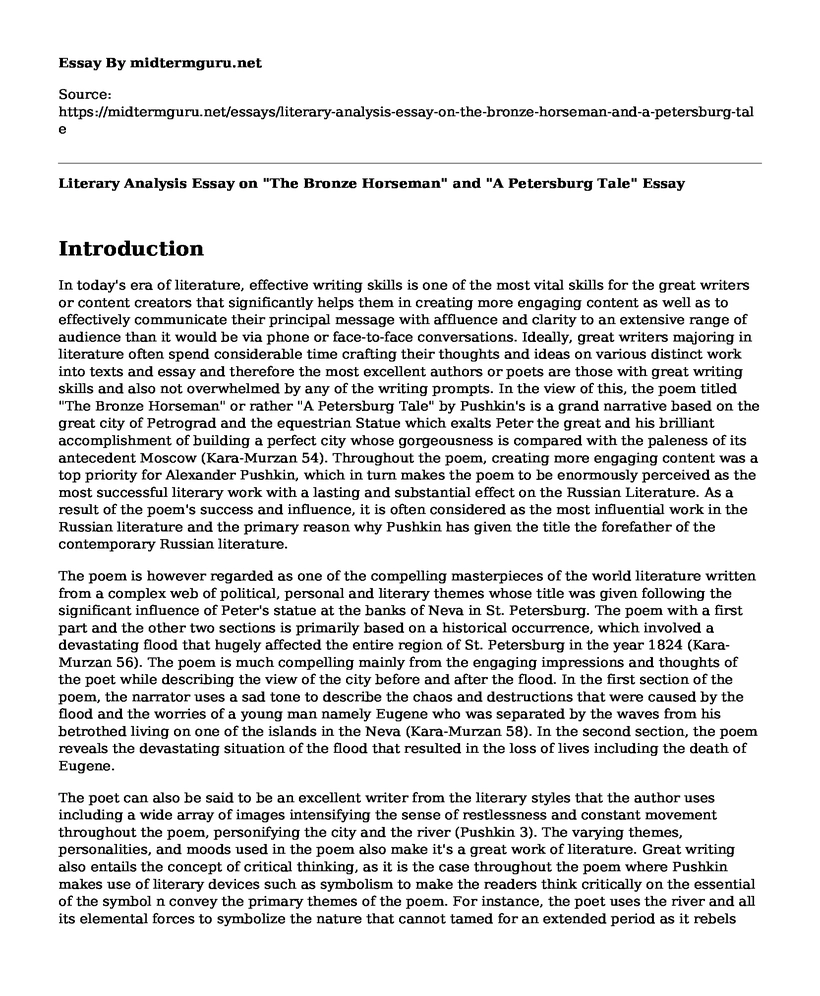Introduction
In today's era of literature, effective writing skills is one of the most vital skills for the great writers or content creators that significantly helps them in creating more engaging content as well as to effectively communicate their principal message with affluence and clarity to an extensive range of audience than it would be via phone or face-to-face conversations. Ideally, great writers majoring in literature often spend considerable time crafting their thoughts and ideas on various distinct work into texts and essay and therefore the most excellent authors or poets are those with great writing skills and also not overwhelmed by any of the writing prompts. In the view of this, the poem titled "The Bronze Horseman" or rather "A Petersburg Tale" by Pushkin's is a grand narrative based on the great city of Petrograd and the equestrian Statue which exalts Peter the great and his brilliant accomplishment of building a perfect city whose gorgeousness is compared with the paleness of its antecedent Moscow (Kara-Murzan 54). Throughout the poem, creating more engaging content was a top priority for Alexander Pushkin, which in turn makes the poem to be enormously perceived as the most successful literary work with a lasting and substantial effect on the Russian Literature. As a result of the poem's success and influence, it is often considered as the most influential work in the Russian literature and the primary reason why Pushkin has given the title the forefather of the contemporary Russian literature.
The poem is however regarded as one of the compelling masterpieces of the world literature written from a complex web of political, personal and literary themes whose title was given following the significant influence of Peter's statue at the banks of Neva in St. Petersburg. The poem with a first part and the other two sections is primarily based on a historical occurrence, which involved a devastating flood that hugely affected the entire region of St. Petersburg in the year 1824 (Kara-Murzan 56). The poem is much compelling mainly from the engaging impressions and thoughts of the poet while describing the view of the city before and after the flood. In the first section of the poem, the narrator uses a sad tone to describe the chaos and destructions that were caused by the flood and the worries of a young man namely Eugene who was separated by the waves from his betrothed living on one of the islands in the Neva (Kara-Murzan 58). In the second section, the poem reveals the devastating situation of the flood that resulted in the loss of lives including the death of Eugene.
The poet can also be said to be an excellent writer from the literary styles that the author uses including a wide array of images intensifying the sense of restlessness and constant movement throughout the poem, personifying the city and the river (Pushkin 3). The varying themes, personalities, and moods used in the poem also make it's a great work of literature. Great writing also entails the concept of critical thinking, as it is the case throughout the poem where Pushkin makes use of literary devices such as symbolism to make the readers think critically on the essential of the symbol n convey the primary themes of the poem. For instance, the poet uses the river and all its elemental forces to symbolize the nature that cannot tamed for an extended period as it rebels against order and tradition as Pushkin states that "It seethes up from below, manifesting itself in uncontrolled passion and violence (Pushkin 4)," to strongly emphasize on the devastating damages caused by the flooding river. The poem's title "The Bronze Horseman" also plays a significant role in helping the readers to profoundly understand what the poem is about concerning the St. Petersburg city and the incredible accomplishment of autocracy over the lives of the ordinary citizens.
Conclusion
Conclusively, from the poem, other writers can learn from the many literary devices the author employs while creating the content of the poem to make the writing great even for the readers. It is also apparent that the poet uses narration techniques such as the tone and symbolism that enables him to express his thoughts and ideas substantially to the audience. Therefore, to be a great writer or a literature major mainly requires one to have skills such as critical thinking, effective communication, and writing skills to ensure that you articulate your thoughts and ideas understandably and easily.
Works Cited
Kara-Murza, Alexey. "Pushkin's poem The Bronze Horseman and its politic-philosophical implications." FILOSOFSKII ZHURNAL 9.2 (2016): 54-65.
Pushkin, Alexendra. "The Bronze Horseman: A St. Petersburg Story" http://www.tyutchev.org.uk/Download/Bronze%20Horseman.pdf Accessed 27 April 2019
Cite this page
Literary Analysis Essay on "The Bronze Horseman" and "A Petersburg Tale". (2022, Dec 27). Retrieved from https://midtermguru.com/essays/literary-analysis-essay-on-the-bronze-horseman-and-a-petersburg-tale
If you are the original author of this essay and no longer wish to have it published on the midtermguru.com website, please click below to request its removal:
- Essay on Satire in The Importance of Being Earnest by Oscar Wilde
- Essay on A Rose for Emily by William Faulkner: A Mirror up to Time
- Essay on Twelve Angry Men
- Critical Essay on The Piano Lesson by August Wilson
- Compare and Contrast Essay on Shakespeare's Macbeth vs. Macbeth Jo Nesbo
- Perceiving Poetry With Heart, Eyes, and Ears in Intermedial Age - Essay Sample
- Book Analysis Essay on Herland







